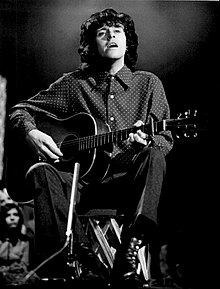Our website is made possible by displaying online advertisements to our visitors.
Please consider supporting us by disabling your ad blocker.
Donovan
Donovan | |
|---|---|
 Donovan performing on The Smothers Brothers Comedy Hour in 1969 | |
| Born | Donovan Phillips Leitch 10 May 1946 |
| Occupations |
|
| Years active | 1964–present |
| Spouse | |
| Partner | Enid Karl (1966–70) |
| Children | 5; including Donovan Leitch and Ione Skye |
| Musical career | |
| Genres | |
| Instruments |
|
| Labels | |
| Website | donovan |
Donovan Phillips Leitch (born 10 May 1946), known mononymously as Donovan, is a Scottish musician, songwriter and record producer. He emerged from the British folk scene in early 1965, and subsequently scored multiple international hit singles and albums during the late 1960s. His work became emblematic of the flower power era with its blend of folk, pop, psychedelica, and jazz stylings.
Donovan first achieved recognition with live performances on the pop TV series Ready Steady Go! in 1965. Having signed with Pye Records that year, he recorded singles and two albums in the folk vein for Hickory Records, scoring three UK hit singles: "Catch the Wind", "Colours" and "Universal Soldier", the last written by Buffy Sainte-Marie. He then signed to CBS/Epic in the US and became more successful internationally, beginning a long collaboration with British record producer Mickie Most. In September 1966, "Sunshine Superman" topped America's Billboard Hot 100 chart for one week and went to No. 2 in Britain, followed by "Mellow Yellow" at US No. 2 in December 1966, then 1968's "Hurdy Gurdy Man" in the top 5 in both countries, and then "Atlantis", which reached US No. 7 in May 1969. The compilation Donovan's Greatest Hits was released in March 1969 and peaked at No. 4 on the Billboard 200.[1]
Donovan became a friend of other prominent musicians such as Joan Baez, Brian Jones, and the Beatles. He taught John Lennon a finger-picking guitar style in 1968 that Lennon employed in "Dear Prudence", "Julia", "Happiness Is a Warm Gun", and other songs.[2] His backing musicians included the Jeff Beck Group, and John Bonham, Jimmy Page and John Paul Jones, who later rose to fame as members of Led Zeppelin. Donovan's commercial fortunes waned after parting with Most in 1969, and he left the industry for a time.
Donovan continued to perform and record intermittently in the 1970s and 1980s. His musical style and hippie image were scorned by critics, especially after the rise of punk rock. His performing and recording became sporadic until a revival in the 1990s with the emergence of Britain's rave scene and in 1994, he moved permanently to Ireland where he still lives.[3] In 1996 he recorded the album Sutras with producer Rick Rubin and in 2004 made the album Beat Cafe. Donovan was inducted into the Rock and Roll Hall of Fame in 2012 and the Songwriters Hall of Fame in 2014.
- ^ "Gold & Platinum". Riaa.com.
- ^ "McCartney Interview 20 November 1968". Dmbeatles.com. Retrieved 18 May 2011.
- ^ Cite error: The named reference
:0was invoked but never defined (see the help page).
Previous Page Next Page


